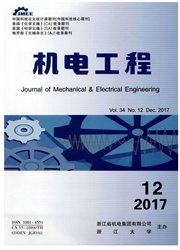

 中文摘要:
中文摘要:
为解决树脂磨具自润滑性能等问题,将微囊技术应用到树脂磨具制备中。开展了β-环糊精/油酸包合物摩擦性能的分析,建立了温度与包合物摩擦性能之间的关系,提出了以包合物作为树脂磨具填料,提高树脂磨具润滑性能的方法。在红外光谱仪上对树脂硬化温度影响包合物的完整性进行了评价,进行了包合物四球摩擦试验以及填充包合物磨具的球-盘摩擦试验。试验结果表明:硬化温度影响包合物的摩擦性能,磨具硬化温度应低于165℃;包合物与酚醛树脂混合物固化后,β-环糊精环状结构完好存在,包合物与酚醛树脂在固化过程中未发生化学反应;填充包合物的磨具与钢球摩擦过程中,通过释放包合物中的油酸起到润滑作用,低载荷下摩擦系数小,钢球表面磨痕浅,高载荷下由于包合物磨具硬度和强度低于普通磨具,摩擦系数增大。
 英文摘要:
英文摘要:
In order to solve the problems of self-lubricating in resin bonded abrasive tools, the microencapsule technology was used to prepare tools. After the analysis of the tribological properties of β-cyclodextrin/oleic acid complex, the relation between curing temperature and tribologieal properties was established. The complex as a filler to abrasive tools was presented to improve the lubricating effect of tools. The influences of curing temperature on the complex were evaluated by the Fourier infrared spectrometer. The tribological properties of complex and tools filled with complex were tested by four-ball tests and ball tray pair tests respectively. The experimental results show that curing temperature can affect complex, and the curing temperature should be lower than 165 ℃;the complex change nothing before and after curing; the good lubrication effect of abrasive tools filled with complex is attributed to the oleic acid released from complex.
 同期刊论文项目
同期刊论文项目
 同项目期刊论文
同项目期刊论文
 期刊信息
期刊信息
